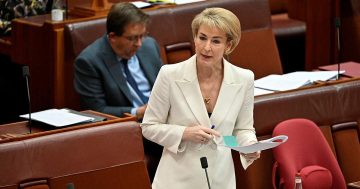
By Anne Twomey
The ACT’s Marriage Equality Bill, which is expected to pass parliament later this month, has revived the controversy about who can legislate for same-sex marriage, with the Commonwealth proposing to challenge the territory’s law.
Despite some bravura statements on both sides, most recognise that the issues are not cut and dried. It all comes down to matters of interpretation, and the interpretation that counts is that of the High Court – not the politicians or lobbyists.
What does the Constitution say?
The Constitution lists specific powers which the Commonwealth Parliament may exercise. They include the power to make laws with respect to “marriage” and “divorce and matrimonial causes”.
But these are not exclusive powers. The states can legislate on these subjects too. Unlike the Commonwealth, the states have full power to legislate on any subject except for a few small areas.
However, if the state law is inconsistent with the Commonwealth law, then the Commonwealth law prevails and the state law becomes inoperative to the extent of the inconsistency.
At the time of federation, each of the colonies had a law governing marriage, and these laws continued in place as state laws until the Commonwealth Parliament enacted the Marriage Act 1961, which provided a single national law in relation to marriage. All the state marriage laws were overridden and eventually repealed.
So it is not accurate to claim that marriage is a Commonwealth matter and the states can’t legislate on the subject. The states have the power to legislate about marriage, but if that law is inconsistent with the Commonwealth law, then the state law will be inoperative.
The meaning of ‘marriage’
The Constitution permits the Commonwealth to legislate with respect to “marriage”, but what does “marriage” mean? Should a court apply its original 1901 meaning, most likely being “the union of a man and a woman to the exclusion of all others, voluntarily entered into for life”? Or should it apply a contemporary meaning – and if so, how is it to be determined?
Given the high level of controversy concerning same-sex marriage, it would be difficult to claim that the term “marriage” has a settled contemporary meaning. Should the High Court take into account opinion polls, contemporary literature, dictionary meanings or the view of the parliament?
Should it consider overseas practice, international treaties or the views of religious or ethnic groups? Or should it say that the Constitution means what it meant when it was came in to force in 1901 and that it is up to the Australian people to change its meaning through a referendum if they wish to do so?
In practice, the High Court has taken different approaches to constitutional interpretation. Sometimes it has applied the original meaning of a term and other times it has applied a “dynamic” approach or recognised a contemporary meaning or changed factual circumstances. One cannot know how the High Court will deal with the meaning of marriage until it actually does so.
If the High Court applied the original meaning of marriage, then the Commonwealth would be unable to rely on the marriage power to legislate for same-sex marriage, leaving this field for the states.
This would put an end to notions of marriage equality, because same-sex relationships would necessarily have to be distinguished from “marriage” in its constitutional sense. It would also raise doubts about whether such relationships could be classified as “marriage” at all.
Inconsistency between laws
If, on the other hand, the High Court interpreted “marriage” in the Constitution as including same-sex relationships, then the question would be whether the Commonwealth’s Marriage Act, even though it defines marriage as a union between a man and a woman, was intended to cover the field of all types of marriage in Australia and to exclude the solemnisation of same-sex marriages under state laws.
There are some indicators in the Act that this is the intent. Section 48, for example, states that marriages solemnised in Australia otherwise than as prescribed by the Act are not valid. Section 88EA also says that a union solemnised in a foreign country between a man and another man or a woman and another woman must not be recognised as a marriage in Australia.
These provisions suggest that the Commonwealth Parliament, when it changed the definition of “marriage” to mean a union between a man and a woman, did not intend to leave it to the states to legislate for same-sex marriage.
Nonetheless, it is still possible that the High Court might regard same-sex marriage as a separate field in which the states can legislate without inconsistency with the Commonwealth’s law.
If so, the state would have to be very careful to stay within the boundaries of this field, establishing its own institution of same-sex marriage and not purporting to give such relationships the same status as marriage under the Commonwealth legislation.
Hence, the Tasmanian bill referred throughout to “same-sex marriage” rather than marriage and avoided reference to marriage equality.
The ACT bill, however, is much less careful, referring to marriage equality and applying the Act to marriages not within the meaning of the Marriage Act. It appears much more vulnerable to attack on inconsistency grounds.
Territories – an extra complication
Added to this mix of interpretative issues is the fact that the ACT is a territory, rather than a state. It derives all its legislative power from the Commonwealth, as well as limitations on its legislative power.
Interestingly, the Commonwealth has full power (similar to state legislative power) to make laws for its territories, so it may have a broader power to deal with same-sex marriage in the territories than it does under its “marriage power”.
The Commonwealth can therefore potentially delegate a broader power to the ACT to legislate on the subject, but it can also legislate to limit that power, as it has previously done in relation to euthanasia.
Alternatively, it can take its chances with a High Court challenge and argue that there is inconsistency.
The need for certainty
Given the uncertain interpretative issues and the importance of the subject, a High Court challenge is the best course. This way, hopefully, the constitutional and legal issues will be resolved, so that Australia’s parliaments can deal with the issue of same-sex relationships with greater certainty as to their powers and the likely effectiveness of their laws.
Anne Twomey receives funding from the Australian Research Council and occasionally does consultancy work for governments or inter-governmental bodies.
This article was originally published at The Conversation.
Read the original article.




















